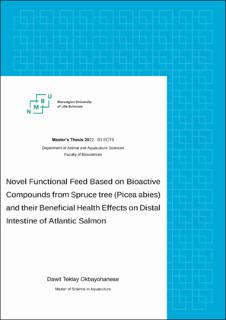| dc.description.abstract | Aquaculture is an important industry that has the potential to stimulate economical growth, create jobs and assisting in poverty alleviation. However, the rapid growth and intensification of this sector has raised concerns about the environmental impact and sustainability of fish farming. Multi-stressor conditions such as infectious diseases, algal blooms, and water quality are among the most serious challenges that causes loss of production to the industry. To face these problems, approved antibiotics and chemotherapeutants are used as a treatment methods. Nevertheless, they are more often neither effective nor environment-friendly. They negatively affect the immune system of aquatic animals and are also a global health threat due to emergence of anti-biotic resistant bacteria. Hence, it is advised to use other prevention approaches such as feed additives in novel functional diets. Bio-active compounds from plants, as immunostimulants and dietary supplements, are currently arisen interest due to their beneficial health effects. The objective of this study was to evaluate the effects of two extracts from Norway spruce (Picea abies) woody biomass (Norway spruce extract 1: NSE1 and Norway spruce extract 2: NSE2), as bio-active compounds in functional diets, on gut health of Atlantic salmon (Salmo salar). For this, 640 Atlantic salmon pre-smolts (28.4 g ± 0.05) were randomly distributed into 16 fiberglass tanks (300 L capacity each). Fish were fed with one of eight diets for four weeks: a commercial-like plant-based control diet with no growth promoting components (D1), a diet with 0.2% of a commercial β glucan (MacroGard®) (D2), and 0.02% (D3), 0.1% (D4) and 0.2% (D5) of NSE1 and 0.02% (D6), 0.1% (D7) and 0.2% (D8) of NSE2. While there was no significant difference in growth performance among all diets, a modulation in the gene expression of immune related biomarkers were detected in the distal intestine of Atlantic salmon. D2 showed an increase in the expression of Prx2 and IL-1b, compared D1. In addition, D5 and D6 also showed an up-regulation of IL-1b, compared to D1, which suggests an activation of the pro-inflammatory immune response. Interestingly, D8 group showed down-regulation of IFNγ, IL-8 and iNOS, which may be related to the control or regulation of the immune response and the maintenance of homeostasis in the distal intestine. Based on these findings, both extracts from Norway spruce were shown to be strong candidates in functional aquafeeds, which could be used in different stages of salmon farming to achieve a more robust and resilient salmon, considering the multi-stressor conditions that fish face every day. | en_US |

